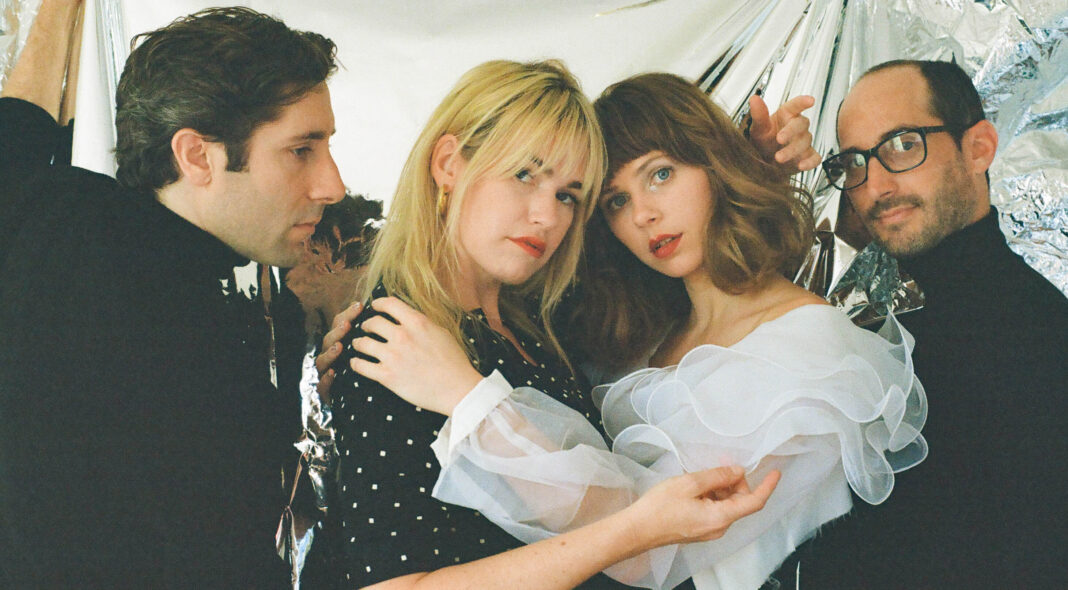Four months into lockdown, Public Practice are a dab hand at picking out custom backgrounds on Zoom. Resident bassist and synth player Drew Citron opts for the cast of Friends (“I mean look how hot Phoebe is,” she says) while frontperson Sam York chooses a galactic number. They’re a slightly chaotic pairing in conversation, exchanging rapid cross-fire about everything from Sex and the City characters to consumerism; it turns out they have a lot of catching up to do.
As life continues to evade normality, conversation quickly turns to practical matters and band business. “God, sorry,” exclaims vocalist Sam York, cutting herself off mid-sentence. Sam is currently staying in Texas, while Drew is still back home in Bushwick – ordinarily, they’re practically neighbours who trade regular loaves of quarantine sourdough. “We really haven’t seen each other face to face at all!” Sam says.
“Yeah, this is our excuse to do a little therapy,” grins Drew. “You can be the moderator.”

It’s safe to say that attempting to make meaningful eye contact through a camera is also miles away from how Public Practice thought their debut album release would pan out – bluntly, ‘Gentle Grip’ is a record begging to be played live. Tapping into an assortment of influences – the amped-up performance and social satire of Talking Heads, the pop thrust of Blondie, and the groove of disco-adjacent new wave – it’s a debut that puzzles over life’s biggest conundrums while throwing surreal moves on the dancefloor. For now, getting to experience the record in any kind of collective way is on hold. “I miss performing,” Sam says. “When you crack a room, and everyone is excited, that energy is crazy! It’s like being on drugs.”
And as performers go, Sam York is unparalleled – in her old band, WALL she was a menacing, intense presence. The post-punk group, which also featured Public Practice’s Vince McClelland, was relatively short-lived – but for those lucky enough to catch them live at New York spaces like Palisades, York’s sheer power was staggering and infectious. Crouching low to eyeball the front row, she had a calculated urgency – bringing to mind a titan like Kim Gordon. Drew – who used to play in the New York band Beverly with Public Practice’s Scott Rosenthal – felt the same way. “The reason I got involved [in Public Practice] was because I saw WALL, and I was like, that’s a fucking front person. That’s an incredible guitarist. I want to work with these people.”
Growing up, Sam originally set her sights on becoming a chemist – “but not for science reasons,” she explains as Drew snorts amusedly. “I was actually interested in the aesthetics of it. I’m like, I wanna be a chemist because I want to wear the all-white lab coat, I wanna have all the glass with the different liquids in. I didn’t care about the science.” In a roundabout way, it makes sense – the vocalist has a background in set design, and sees each show or video as an all-encompassing visual event. Being exposed to the music of Laurie Anderson, and watching Yeah Yeah Yeahs’ video for ‘Maps’ as a teenager was Sam’s big lightbulb moment, she explains. “I want to create a happening, so it’s not just your average rock show with four people standing on stage playing their songs.”
“Sam decked out the venue for our EP release show,” Drew chips in, looking back to Public Practice’s 2018 release ‘Distance is a Mirror’. “Every centimetre was covered in mylar.” “To this day,” Sam laughs, going back to her fleeting science career, “my all-white jumpsuit is one of my favourites.”
As the first sparks of Public Practice started to fizzle, the new four-piece took their time in figuring out exactly what their band should represent. “We took a long time saying, what is this?” Drew explains. “‘Gentle Grip’ is such a culmination of that incubation period”. Though the more absurdist aspects of WALL and Beverly’s Scot-pop turned Stateside sound loiter at the fringes, the group’s debut album ‘Gentle Grip’ is more focused on limb-jerking new wave, and an undercurrent of 80s disco straight out of their home city; like the B-52s or Television partying the night away at Paradise Garage. They skewer the constant “moral gymnastics” of trying to be an ethical consumer in a world built out of one-use plastic; the pang of wanting to have it all, but knowing that somewhere, it’ll cost someone. ‘Compromised’ is one such track which delves into this conundrum. “Your house is important/Your car is important/Your shoes are important/Dinner’s important!” Sam rallies, backed by spiny post-punk. “You don’t want to live a lie, but it’s easy/Consume, consume, consume me”
“I’m not 20 years old anymore,” Sam says, “and my concept of time is shifting. What do I think is important, and how I want to exist as a human in the world – which also means a consumer, you don’t get to not be a consumer in modern society – you have to grapple with those questions. What are you willing to compromise to have the things that you want, materially? We don’t wanna be living a lie, but it’s really easy to not pay attention. It’s getting harder,” she points out, referencing the Black Lives Matter movement, and the momentum behind climate change protests, “which is really awesome. We’re collectively becoming more aware of how our actions impact the world at large, and getting better at talking about it amongst ourselves.”
Though ‘Gentle Grip’ was written long before the pandemic and wider discussion around white supremacy and capitalism, many of Public Practice’s songs – which also examine confronting the darker aspects of history head on, and grapple with making the most of the limited window you get in life – seem oddly prescient. “I think the strings of capitalism are a little bit looser right now,” Drew nods, pondering how her mind-set has shifted over the last few months. Like many, stepping back from the hubbub of daily life has given some extra time to reflect. “Surprise, surprise, I now have so much brain space left over for dismantling systemic racism, it turns out. That’s all I think about now, waking up to the reality of America. It’s no coincidence that the quarantine led to this moment,” she adds, making reference to the Black Lives Matter uprising in particular. “We’ve all been cooped up for so long, literally and figuratively, and there’s nothing to distract us. It’s amazing,” she says. “I’m going to make a concerted effort to be a little more conscientious as things open back up”
The sheer joy that emanates from the core of Public Practice, Drew and Sam reckon, speaks to a kind of togetherness that stems back to the 80s New York disco scene – a place for outsiders and weirdos from all other the city to gather and dance. “There’s massive inclusivity on a dance floor – a dance floor is for everybody,” Sam concludes. “You can all be in a space and share, and live inside the music. It’s very powerful and very healing”


